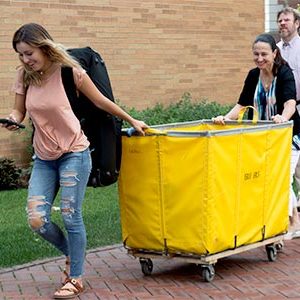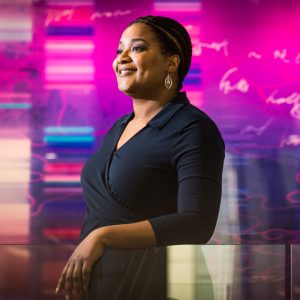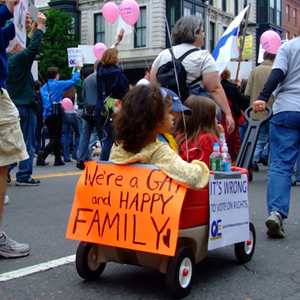For Lul Mohamud, Commencement weekend was more than an opportunity to celebrate her achievements. It was a chance to honor the sacrifices her parents, Sahdea Amalin and Hassan Mohamud, made to help her achieve her dreams. A neuroscience major, Mohamud (CAS’19) couldn’t wait to stand in her scarlet cap and gown and “turn around and look back and feel the love and excitement radiating from the people who worked so hard to get me here.”
Her father and mother emigrated to the United States from Somalia, her father in 1986, at age 24, her mother in 1988, at age 26. They arrived seeking better lives (he hoped to pursue a career in business and she dreamed of becoming a teacher). They met in the Washington, D.C., area and went on to raise five children in Silver Spring, Md.
“To come to a country where nobody speaks your language—let alone knows where your country is on a map—and start from nothing takes a special kind of will, a special kind of bravery,” Mohamud says of her parents.
She calls them Hooya and Baba (“Mom” and “Dad” in Somali) and talks movingly about how they put their own dreams of pursuing a college education aside so their children could achieve theirs. “When I think of some of the things they’ve had to go through, I sometimes don’t know if I would have made it through that,” their daughter says.
Her parents instilled in their children the importance of giving back, she says, noting that they were always “talking about our common humanity…and how you’ll be accountable for everything you do in the world, so why wouldn’t you want to be defined by your compassion, your generosity, your kindness, your willingness to serve others?”
The siblings were raised to think for themselves. Mohamud compares her childhood home to a “mini-Congress,” where debate was encouraged. And she says that while all five are different, they share a commitment to social justice and a determination to persevere through tough times, something their parents taught by example.
The newly minted graduate says she was attracted to BU because she wanted a university that would challenge her. She chose the College of Arts & Sciences neuroscience program because she had always been fascinated by how the brain works—an interest fueled by family members with Alzheimer’s disease and those in her family’s close-knit Somali community who had experienced trauma. She saw firsthand what it was like for people suffering from what she later learned were psychological disorders.
“We didn’t talk about it in our community. They didn’t have words for it, because in our culture we don’t have the privilege of being able to talk about ailments we can’t see,” Mohamud says. She recognized that their inability to talk about trauma and mental illness was holding people back, and resolved to pursue a career helping trauma victims recover their lives, rather than constantly reliving their past.
In addition to juggling the demands of the neuroscience program, Mohamud was a CAS Dean’s Host and a peer fellow for the school’s FY 101 program, as well as an RA at Sleeper Hall her junior and senior years. Freshman year she joined 16,000 Strong, a BU student-run campaign created to prevent sexual assault and violence, eventually becoming cochair.
Now, Mohamud is one step closer to pursuing her dream. In fall 2019, she’ll enroll in the Emory University Rollins School of Public Health, where she’ll pursue a master’s degree in global health, with a concentration in community health assessment. She hopes to work in Africa and in the United States doing fieldwork with individuals who have experienced trauma and creating programs to address their needs.
She also says she couldn’t wait to hand her parents her BU degree. “It’s theirs—it’s theirs. Because if they hadn’t raised me the way they did, I don’t think I would have made it these four years, with myself intact, with myself stronger and fortified and better understood. I want them to see and believe that all of my successes are the result of their love, dedication, and sacrifice.”

















































Mohamed, your share is so beautiful and touching. I graduated from BU School of Fine Arts in 1974, and I don’t think I had the kind of gratitude you shared, for my parents’ sacrifice. Now I realize my grandparents sacrificed so much, leaving Europe to escape poverty and anti-semitism, for better opportunities in this country. May this feeling you shared take you far as you pursue your passions in graduate school. Thank you.
Sheila Kaufman Lewis, BU SFA, ’74